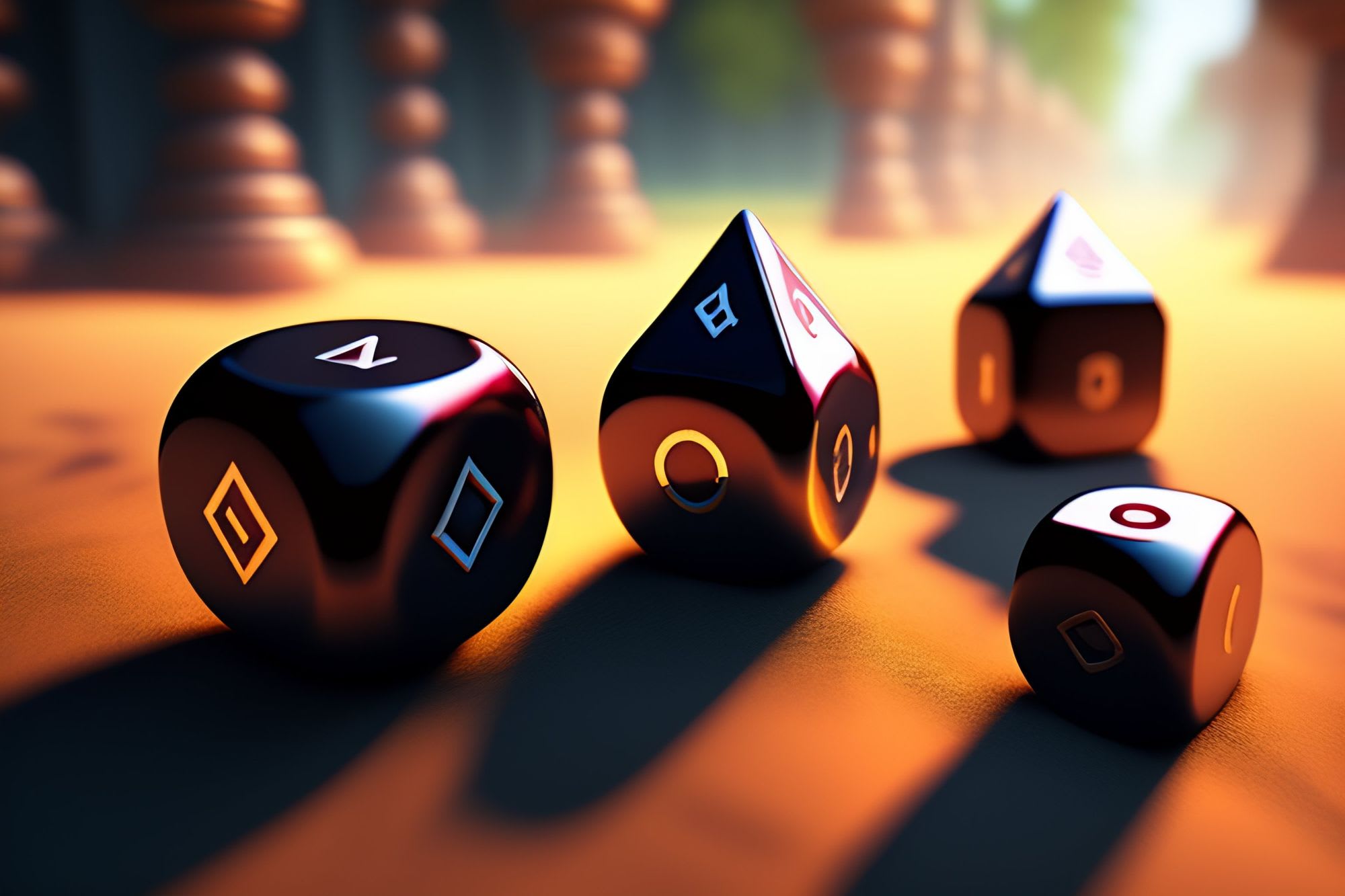A Beginner's Guide to Rolling the Bones in Dungeons & Dragons
Welcome, brave adventurer, to the fantastical realm of Dungeons & Dragons (D&D)! As you embark on this epic journey of imagination and storytelling, one essential tool will become your faithful companion—the dice.
These tiny polyhedral objects hold the fate of your characters, the outcome of battles, and the twists of your narrative.
In this Dice 101 guide, we'll delve into the world of D&D dice, teaching you how to roll, what to expect, and providing external resources to aid your understanding.

Understanding D&D Dice
D&D employs a unique set of dice with various shapes and numbers of sides, each serving a specific purpose in resolving actions and events within the game. Here's a breakdown of the different dice types you'll encounter:
D4 (Four-Sided Die): The pyramid-shaped die is primarily used for determining smaller values like weapon damage or minor effects.
D6 (Six-Sided Die): The classic cube-shaped die is familiar to most people. In D&D, it's often used for damage rolls, skill checks, and other simple tasks.
D8 (Eight-Sided Die): This die, with its eight triangular faces, is frequently used to calculate weapon damage and certain spell effects.
D10 (Ten-Sided Die): With double-digit numbering, the d10 has a prominent role in percentile rolls, where it determines outcomes in increments of 10%.
D12 (Twelve-Sided Die): With 12 sides, this die is often used for larger weapon damage rolls and specific character abilities.
D20 (Twenty-Sided Die): The crown jewel of D&D dice, the d20 is the heart of the game's mechanics. It's used for attack rolls, saving throws, skill checks, and determining the success or failure of most actions.
Percentile Dice (Two Ten-Sided Dice): A pair of d10s—one numbered from 0 to 9, the other from 00 to 90—combine to create a percentile die. It's used for nuanced percentage-based rolls.
Rolling the Dice
Rolling dice in D&D is a blend of anticipation, luck, and role-playing excitement. Here's a step-by-step guide to mastering the art of the roll:
Select the Appropriate Die: Depending on the action you're attempting or the outcome you're determining, pick the correct type of die. Need to strike a foe? Grab a d20. Measuring damage? Grab the appropriate damage die.
Declare Your Intent: Inform your Dungeon Master (DM) what action you're attempting. Whether it's a sword swing, a spell, or a skill check, clarity is key.
Add Relevant Modifiers: Your character's abilities, skills, and equipment might grant you bonuses or penalties. Add or subtract these modifiers to/from your roll. For instance, if you're making a Dexterity-based attack, add your Dexterity modifier.
Roll the Die: With intent in mind and modifiers calculated, give the die a hearty toss. Let the fate of the roll guide your path.
Interpret the Result: The number facing up after the roll, plus your modifiers, determines the outcome. High rolls often lead to success, while low rolls can introduce complications.
Rolling for Checks, Attacks, and Damage
In the world of D&D, dice are your companions not just in storytelling, but also in resolving the nitty-gritty of the game. Here's a breakdown of how dice are used for checks, attacks, and damage:
Checks: When your character attempts to perform an action that has a degree of uncertainty, like sneaking past guards or deciphering ancient runes, the DM might call for a skill check. Roll a d20, add the relevant ability modifier, and any proficiency bonus if applicable. If your total meets or exceeds the DM's designated difficulty class (DC), you succeed.
Attacks: Engaging in combat? Roll a d20 to determine whether your attack hits the target. Add your attack bonus, which includes your proficiency bonus and any relevant ability modifier. If your total equals or surpasses the target's Armor Class (AC), you successfully hit.
Damage: Once your attack hits, it's time to determine the damage you deal. Different weapons and spells have specific damage dice associated with them. Roll the specified damage die and add any relevant modifiers to calculate the total damage inflicted.
Interpreting Critical Hits and Failures
Dice rolls in D&D are not only about success and failure but also about the extremes—critical hits and critical failures:
Critical Hits: If you roll a natural 20 on your d20 attack roll, it's a critical hit! This means your attack is especially effective, often resulting in bonus damage. Roll your damage dice twice and add all relevant modifiers for a devastating blow.
Critical Failures: Conversely, rolling a natural 1 on your attack roll is a critical failure. While not an official rule, many DMs introduce humorous or dramatic consequences for these rolls, adding a touch of unpredictability to the game.
What to Expect
In Dungeons & Dragons, dice rolls are the foundation of uncertainty and excitement. Prepare to experience a range of emotions, from exultant victory to unexpected defeat, as your character's destiny unfolds through the rolls of the dice.
Every roll contributes to the rich tapestry of your adventure, making each session an unpredictable and thrilling experience.
External Resources
As you delve deeper into the world of D&D dice, these external resources will serve as your guides:
Wizards of the Coast: The official D&D website provides rulebooks, guides, and forums for players of all levels. Visit Wizards of the Coast
D&D Beyond: An interactive digital toolset that simplifies character creation, rules lookup, and gameplay management. Explore D&D Beyond
How to Play Dungeons & Dragons (Geek & Sundry): A beginner-friendly video series explaining the basics of D&D. Watch the Series
Critical Role: A popular D&D livestream where voice actors play through epic campaigns, providing a great example of gameplay. Tune into Critical Role
Reddit - r/DnD: An active community where players share stories, ask questions, and discuss all things D&D. Join the Conversation
With this Dice 101 guide and the provided external resources, you're ready to roll the dice and embark on a journey of creativity, camaraderie, and endless adventure in the world of Dungeons & Dragons. May your rolls be ever in your favor!
Remember, the world of D&D is boundless, and the dice are your companions through every twist and turn. Embrace the unpredictability, weave your own tales, and let the clatter of dice be the music of your epic odyssey.

